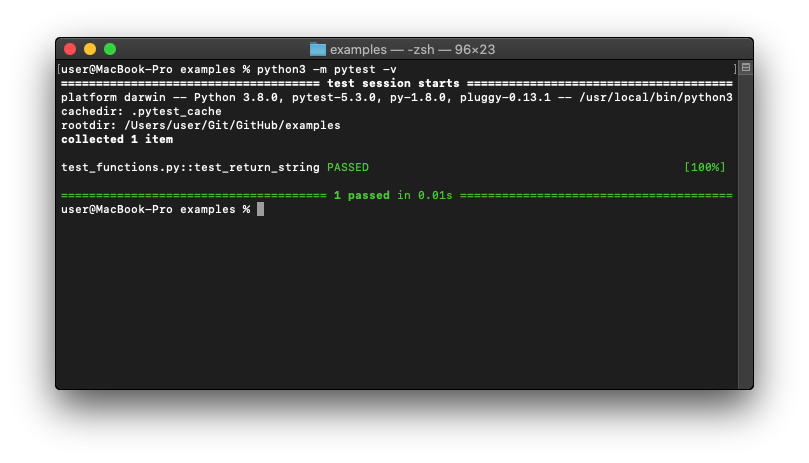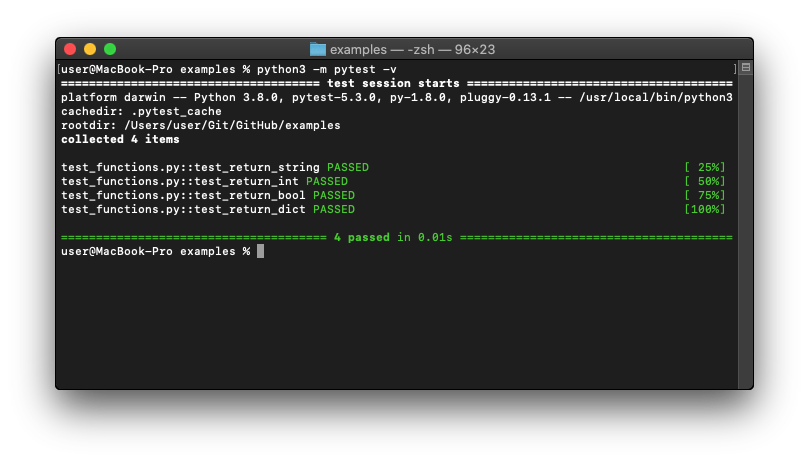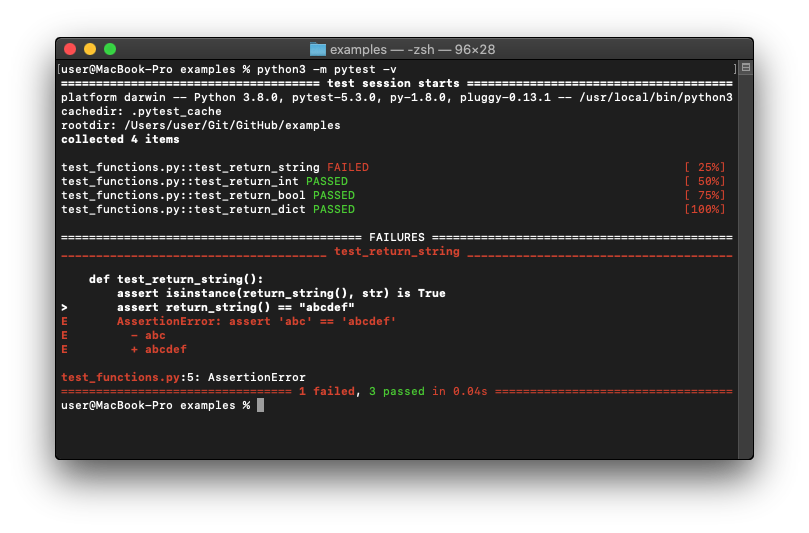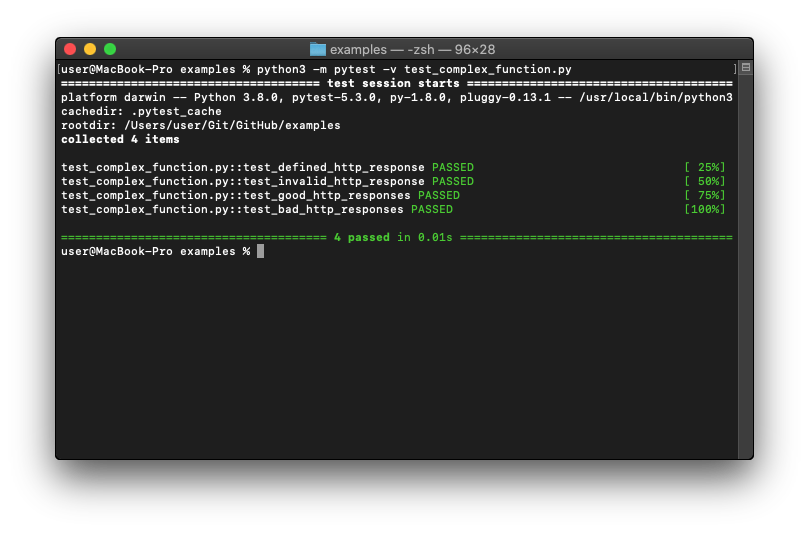Check your code for bugs the hardest easiest way possible
Automatic testing using PyTest

When I first started writing code I’d write my code, run it, and that’d be my testing. Over time as my programs became more complex and had more dependencies I started running into issues where testing became quite time consuming and hard to comprehensively test every case.
Enter testing frameworks, there’s a few types such as unit testing, mock testing, and fuzz testing. For this we’re going to focus on unit testing. There’s a few different frameworks you can use for this, some common examples include PyTest, UnitTest, DocTest. Let’s focus on PyTest for this post as it’s what I’ve used most.
Prerequisite
You’ll need to install pytest to follow along via python3 -m pip install pytest
Unit testing
The basic premise is that you execute the function and specify the expected output.
For example let’s take this function
function.py
def return_string():
"""Returns a string"""
return "abc"
It’s a very basic function that just returns the str "abc". To create a test for this it’s pretty straight forward, the output should always be the type str.
test_functions.py
from functions import *
def test_return_string():
assert isinstance(return_string(), str) is True
There’s a few things to go over.
-
You’ll need to import the class or functions you are testing.
-
The tests should be in a different file with either a prefix of
test_*or a suffix of*_test. -
The functions must be prefixed with
test_*. -
The assert function is where you specify the conditions for a pass or fail. If an assertion is false then an error is thrown and the test is skipped.
In the example above assert is checking if what return_string() is returning is the type str.
Let’s run it and see what we get.

Nice! Our function is returning a str that’s what we want, let’s build a few more functions and some tests.
function.py
def return_string():
"""Returns a string"""
return "abc"
def return_int():
"""Returns a integer"""
return 123
def return_bool():
"""Returns a boolean"""
return True
def return_dict():
"""Returns a dictionary"""
dictionary = {}
dictionary["testing"] = 1234
return dictionary
test_functions.py
from functions import *
def test_return_string():
assert isinstance(return_string(), str) is True
def test_return_int():
assert isinstance(return_int(), int) is True
def test_return_bool():
assert isinstance(return_bool(), bool) is True
def test_return_dict():
assert isinstance(return_dict(), dict) is True

Ok let’s switch it up a bit, let’s change test_return_string() so it checks the value returned as well.
def test_return_string():
assert isinstance(return_string(), str) is True
assert return_string() == "abcdef"

You can see the test fails because we’re testing for abcdef and not abc like we should be. Let’s fix that.
def test_return_string():
assert isinstance(return_string(), str) is True
assert return_string() == "abc"
And just like that we’ve passed the test.
Complex Example
Now let’s make a slightly more complicated function
complex_function.py
# Allow specifying an expected code for custom use
def check_http_response(status_code, expected_code=None):
"""Checks if response is a expected or a known good response"""
if status_code == expected_code:
return True
elif status_code == 200:
print('HTTP 200\nOK')
return True
elif status_code == 201:
print('HTTP 201\nCreated')
return True
elif status_code == 204:
print('HTTP 204\nEmpty response')
return True
elif status_code == 400:
print('HTTP 400\nBad request')
return False
elif status_code == 401:
print('HTTP 401\nCheck Authorisation')
return False
elif status_code == 403:
print('HTTP 403\nPermission denied, check AW permissions')
return False
elif status_code == 404:
print('HTTP 404\nNot found')
return False
elif status_code == 422:
print('HTTP 422\nInvalid SearchBy Parameter')
return False
else:
print('Unknown code %s' % status_code)
return False
and here’s the tests for it
test_complex_function.py
from complex_function import *
def test_defined_http_response():
"""Test HTTP expected response"""
assert check_http_response(200, 200) is True
def test_invalid_http_response():
"""Tests unexpected response is returns as False"""
assert check_http_response(999) is False
def test_good_http_responses():
"""Checks good responses are True"""
for code in (200, 201, 204):
assert check_http_response(code) is True
def test_bad_http_responses():
"""Checks bad responses are False"""
for code in (400, 401, 403, 404, 422):
assert check_http_response(code) is False
It’s not great code at all, but we have a lot of functions that are using it and if we refactor it incorrectly it could lead to some issues. Luckily we have automatic tests and they’ve all passed refactor, so let’s refactor this code:
complex_function.py
def check_http_response(status_code, expected_code=None):
"""Checks if response is a expected or a known good response"""
status_codes = {}
status_codes[200] = True, 'HTTP 200: OK'
status_codes[201] = True, 'HTTP 201: Created'
status_codes[204] = True, 'HTTP 204: Empty Response'
status_codes[400] = False, 'HTTP 400: Bad Request'
status_codes[401] = False, 'HTTP 401: Check WSO Credentials'
status_codes[403] = False, 'HTTP 403: Permission denied'
status_codes[404] = False, 'HTTP 404: Not found'
status_codes[422] = False, 'HTTP 422: Invalid searchby Parameter'
if status_code == expected_code:
return True
if status_code in status_codes:
print(status_codes[status_code][1])
return status_codes[status_code][0]
print('Unknown code %s' % status_code)
return False
That code is much better, now let’s test it

Amazing, The tests have passed, and furthermore all of the other functions that used check_http_response() also have tests so we know they’ll all work too. So we’ve changed our code and can confidently deploy it knowing that the external behaviour is unchanged.
But how do we know that all of the code has been tested? Check out my next post on Code Coverage
Resources
